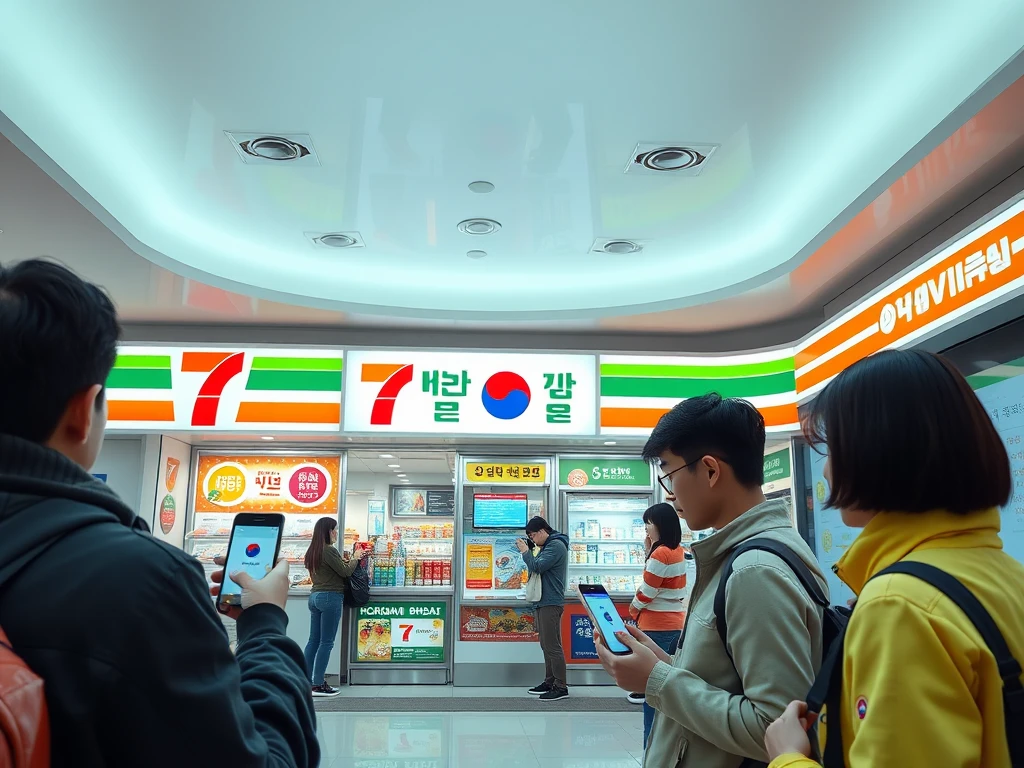Revolutionary Move: 7-Eleven South Korea to Accept CBDC Payments in National Pilot Program

Exciting news for crypto enthusiasts and convenience store shoppers in South Korea! Get ready to pay for your Slurpees and snacks with a cutting-edge form of digital money. 7-Eleven South Korea is making headlines by joining the nation’s central bank digital currency (CBDC) pilot program. This initiative signals a significant leap towards mainstream digital currency adoption and promises a glimpse into the future of payments.
What’s the Buzz About 7-Eleven and CBDC in South Korea?
Imagine walking into your local 7-Eleven in South Korea and paying for your items using a CBDC. This is no longer a distant dream but a reality as 7-Eleven South Korea actively participates in the country’s national CBDC pilot program. Starting April 1st and running until June 30th, select 7-Eleven stores will accept CBDC payments, marking a crucial step in testing and potentially implementing this innovative payment method nationwide.
But why is this such a big deal? Let’s break down the key aspects:
- Real-World Testing: This isn’t just theoretical; it’s a live test. 7-Eleven, a major convenience store chain in South Korea, is opening its doors to CBDC payments, providing invaluable real-world data and user feedback.
- Incentive for Adoption: To encourage users to embrace this new technology, 7-Eleven is sweetening the deal with a 10% discount on all products purchased using CBDC during the pilot program. Who doesn’t love a discount, especially while trying out innovative tech?
- Digital Transformation Driver: Moon Dae-woo, head of 7-Eleven’s digital innovation division, emphasizes the company’s commitment to digital advancements. Participating in the CBDC pilot program is seen as a strategic move to accelerate 7-Eleven’s broader digital transformation, keeping them at the forefront of retail innovation.
South Korea’s Grand CBDC Experiment: What You Need to Know
The 7-Eleven initiative is part of a larger national effort. South Korea is serious about exploring the potential of CBDCs. This pilot program isn’t limited to just convenience stores; it’s a comprehensive test involving various sectors and a significant number of participants.
Here’s a closer look at the nationwide CBDC pilot program:
| Feature | Details |
|---|---|
| Duration | April 1st to June 30th |
| Participants | 100,000 citizens |
| Participating Banks | KB, Koomin, Shinhan, Hana, Woori, NongHyup, IBK, Busan |
| Participating Merchants | 7-Eleven, coffee shops, supermarkets, K-Pop merchandise stores, delivery platforms |
| Conversion Limit | 5 million won ($3,416) |
Essentially, eligible citizens in South Korea can convert their traditional bank deposits into CBDC tokens, which are then stored on a distributed ledger. These tokens mirror the value of the Korean Won, allowing for seamless transactions within the participating ecosystem. This controlled environment allows the Bank of Korea and other financial authorities to observe the practical implications of a CBDC in action.
CBDC vs. Crypto: What’s the Difference?
You might be thinking, “Isn’t CBDC just another cryptocurrency?” While both are digital currencies, there are fundamental differences. CBDCs, unlike decentralized cryptocurrencies like Bitcoin, are issued and regulated by central banks – in this case, the Bank of Korea.
Here’s a quick comparison:
| Feature | CBDC | Cryptocurrency (e.g., Bitcoin) |
|---|---|---|
| Issuer | Central Bank (Government) | Decentralized Network |
| Control | Government Controlled and Monitored | Decentralized, User-Controlled |
| Anonymity | Limited or None | Potentially Anonymity-Focused (depending on the crypto) |
| Purpose | Modernized, Efficient Payment System within a Nation | Varied – Store of Value, Decentralized Finance, Payments, etc. |
CBDCs aim to modernize payment systems, offering speed and efficiency while maintaining government oversight. They are not designed to offer the same level of anonymity or decentralization as many cryptocurrencies. The South Korea CBDC pilot program is focused on exploring the potential of this government-backed digital currency to enhance the national financial infrastructure.
Why is South Korea Pushing for CBDC?
South Korea is a tech-forward nation always looking to innovate. The push for CBDC reflects a desire to remain at the cutting edge of financial technology and potentially create a more efficient and modern monetary system. The Financial Supervisory Service (FSS) has stated that this CBDC pilot program is a step towards creating a prototype for a “future monetary system.”
By testing CBDC in a practical setting like 7-Eleven and other everyday merchants, South Korea is taking a proactive approach to understanding the benefits and challenges of implementing a national digital currency. This pilot program will provide valuable insights into user adoption, system performance, and the overall feasibility of widespread CBDC usage.
The Future of Digital Payments is Now
The collaboration between 7-Eleven South Korea and the national CBDC pilot program is more than just a news story; it’s a glimpse into the evolving landscape of finance. As South Korea tests the waters of digital currency on a national scale, the world watches closely. Will CBDCs become the norm? This pilot program and initiatives like 7-Eleven’s participation will play a crucial role in shaping the future of how we transact and interact with money.
Keep an eye on South Korea – they might just be paving the way for a revolutionary shift in global payment systems, one CBDC transaction at a time at your local 7-Eleven!







